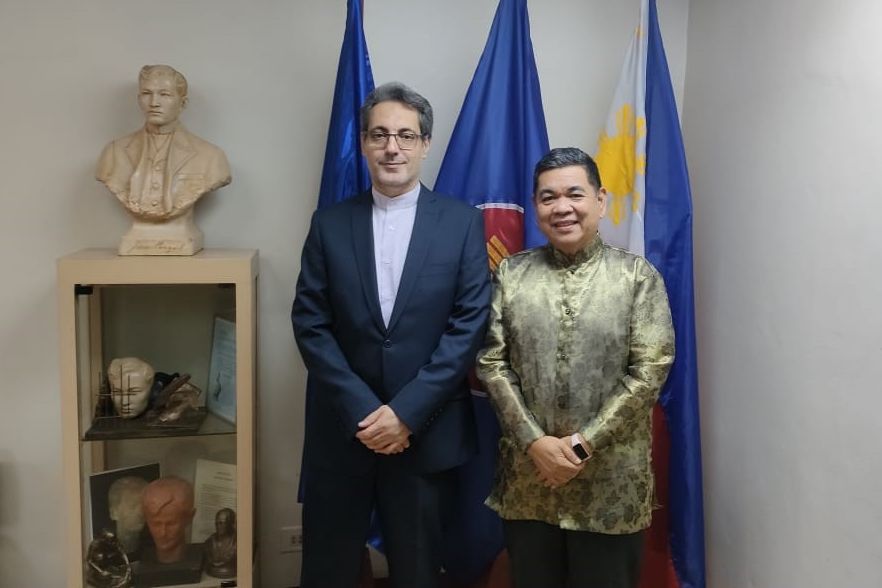Consultation on Cultural Weeks between Iran and the Philippines
The Cultural Counselor of Iran and the Executive Director of the National Commission of Culture and Arts of the Philippines met to discuss the signing of a draft exchange program and the organization of cultural weeks in both countries, in light of the upcoming 60th anniversary of diplomatic relations between Iran and the Philippines.

According to the report from the Public Relations Department of the islamic culture and relations organization, AbdulMajid AbulQasemi, the Cultural Counselor of the Islamic Republic of Iran in the Philippines, along with Oscar Getuya Casaysay, the Executive Director of the National Commission for Culture and Arts of the Philippines, and Mariel Ja Semini-A Ni Ni, the Director of the Department of International Programs, convened at the administrative building for discussions.
AbulQasemi expressed hope for the development of cultural and artistic relations between Iran and the Philippines. He emphasized the importance of implementing the draft cultural exchange program, which was prepared last year to implement the provisions of the cultural agreement between the two countries, and urged for its prompt signing.
The Cultural Counselor highlighted the existing cultural relations between the people of Iran and the Philippines, citing the presence of Filipino experts in the medical and engineering sectors in Iran, as well as a significant number of Iranian students studying in Philippine universities.
He stated, "We have a duty to implement joint cultural and artistic programs to deepen relations and enhance people's understanding of each other's culture and civilization."
AbulQasemi further mentioned that the cultural agreement between Iran and the Philippines was signed in 1984, approved by both countries' parliaments, and has facilitated extensive cultural cooperation throughout the years. He emphasized the importance of renewing the contract for an additional three years to facilitate the implementation of cultural and artistic programs.
Regarding Iran's rich historical heritage and attractions across various fields, AbulQasemi acknowledged that false propaganda had distorted the image of Iranian civilization in recent years. He stressed the importance of cultural and artistic delegations from both countries working together to counteract negative advertisements and promote cultural understanding, with artists serving as cultural ambassadors through various artistic programs.
In line with the 60th anniversary of diplomatic relations between Iran and the Philippines, the Cultural Counselor proposed the implementation of cultural weeks in both countries as part of the draft exchange program. These cultural weeks would showcase various cultural and artistic groups in music, theater, cinema, as well as exhibitions of handicrafts, traditional clothing of ethnic groups, calligraphy, photography, food, and artworks for a duration of one to ten days.
To promote the export of cultural products, AbulQasemi suggested leveraging the private sector's capacity in providing cultural and artistic products.
The Cultural Counselor also highlighted the provisions in the memorandum related to library activities and the exchange of information between library experts. Given Iran's expertise in preserving and restoring historical written works, he expressed readiness to organize training workshops on manuscript restoration in Iran or the Philippines, provided there are suitable technical facilities. This initiative aims to preserve important cultural heritage documents in the Philippines.
AbulQasemi further proposed the participation of Iranian artists in international festivals of cinema, music, theater, and cultural exhibitions in the Philippines. He suggested allocating space for independent exhibitions showcasing calligraphy, gilding, handicrafts, and photography on various themes.
Introducing Islamic Culture in the Philippines
Oscar Getuya Casaysay, the Executive Director of the National Commission for Culture and the Arts of the Philippines, welcomed the idea of cultural weeks between the two countries. He proposed organizing a wrestling and zorkhaneh (traditional Persian sport) demonstration as part of the cultural week or as a separate event to showcase the ancient traditions of Iran.
Referring to notable figures from both countries, Casaysay emphasized the possibility of issuing a joint commemorative stamp through cooperation between the postal services of Iran and the Philippines, which was also positively received.
Casaysay, being familiar with Islamic religion and culture, particularly in Mindanao, expressed the intention to honor the natives and respect their religion as the first people who converted to Islam in the Mindanao archipelago. He mentioned that Indonesia, as an Islamic country, plans to organize a program in October to introduce Islamic culture, and "SM" has offered to provide a venue for this cultural event for free for one week. He extended an invitation for Iran to participate in this program, which will include an exhibition of calligraphy, food, film screenings, and musical performances.

Write your comment.